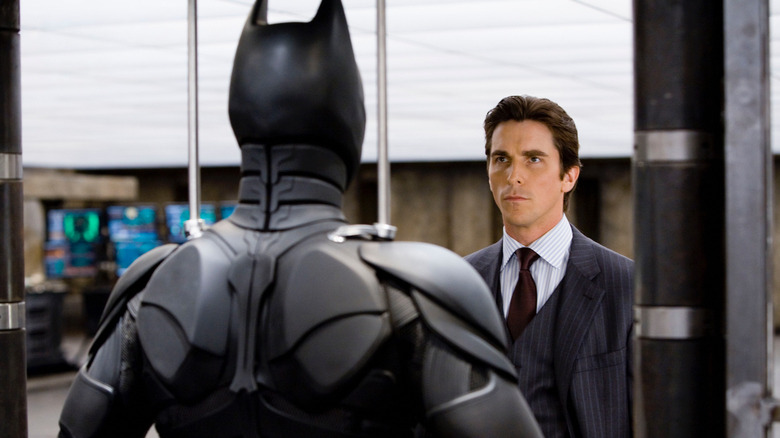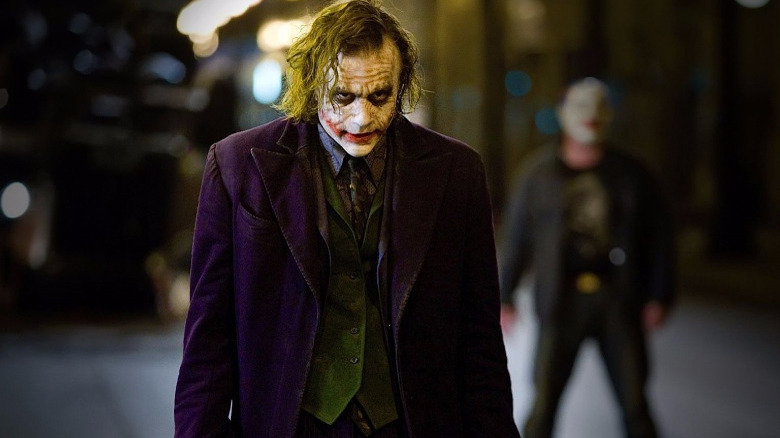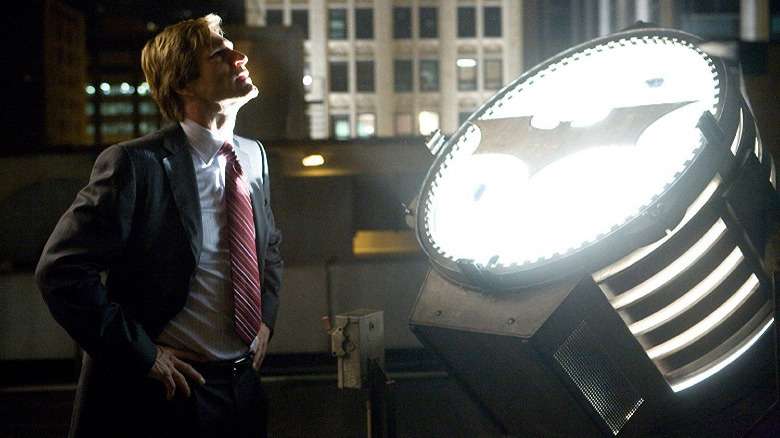The Dark Knight Ending Explained: Sometimes The Truth Isn't Good Enough
Is "The Dark Knight" Christopher Nolan's magnum opus? Personally, I feel "The Prestige" has emerged over time as the movie that perhaps best encompasses the motifs of Nolan's work (thematic, narrative, and technical). But there's no denying the impact Nolan's Bat-buster had on the film industry in 2008, not least of all the "Batman" franchise. Building on what he had done three years earlier with "Batman Begins," Nolan's movie cemented the modern era of Caped Crusader cinema. Gone are the grotesque Expressionist stylings of Tim Burton or the Day-Glo campiness of Joel Schumacher. Batman films can only be Very Serious now.
It's an odd legacy, given "The Dark Knight" itself is a movie full of characters cracking wise — even Heath Ledger's Joker borders on being as funny as he is unnerving. When you compare it to Matt Reeves' unrelentingly gloomy "The Batman" or the sheer joylessness of Zack Snyder's "Batman v Superman: Dawn of Justice," Nolan's film almost comes across as a pulpy jaunt through the streets of Gotham City and not an intense, grounded crime-thriller parable for the War on Terror.
Equally curious is the political subtext of "The Dark Knight." Where Steven Spielberg's "Munich" critiques Israel's response to the Munich massacre as a way of commenting on the War on Terror, Nolan's Bat-flick seems far more interested in reacting to the U.S.' post-9/11 military campaign than saying anything about it. Nolan has long denied his Batman movies have a specific political slant, telling Rolling Stone in 2012 they're designed to "show the cracks of society, show the conflicts that somebody would try to wedge open," as a way to encourage audiences to form their own thoughts about these issues.
Maybe that's why the ending to "The Dark Knight" has long been the subject of dramatically different interpretations.
'It's not about the money, it's about sending a message'
"The Dark Knight" centers on three characters, each of whom recognizes the problems with the status quo in Gotham but has very different approaches to dealing with them. There's district attorney Harvey Dent (Aaron Eckhart), who believes it only takes a single person willing to fight for what's right to change the city's broken social systems from within. There's the Joker, a murderous criminal who believes a fair and just world is one governed by chaos and anarchy. And then there's Bruce Wayne, aka the masked vigilante Batman (Christian Bale), whose own philosophy lies at the nexus of those two extremes.
Unlike Gotham's mobsters and corrupt officials, Dent and Joker have no interest in money or power. Their goal is to impose their will upon the city, transforming it however they deem fit without compromising their beliefs. Neither one succeeds in doing this. By the end of the film, Dent has given up his crusade for justice in order to take his revenge as the sadistic vigilante Two-Face. Joker, on the other hand, claims he's an "agent of chaos" and quips, "Do I really look like a guy with a plan?" Yet, his war on Gotham is way too carefully executed for a guy who insists he lives his life without rules.
In the end, it's Batman who comes closest to "winning" this war — a billionaire willing to bend his personal code of ethics and morality, but never to the breaking point. He's the one whose faith is rewarded when Joker's attempt to pit Gotham's classes against one another fails and proves to be the better man than Dent, even taking the fall for Dent's murder spree as Two-Face because he feels it's the right thing. See the issue yet?
The ending we deserve, but not the one we need right now
When "The Dark Knight" hit theaters, The Wall Street Journal made the case for it being a "paean of praise" to George W. Bush, comparing Christian Bale's Batman to the 43rd U.S. president (himself born into a life of wealth and privilege, like Bruce Wayne) and his military campaign in response to the September 11, 2001, terrorist attacks. Disagreeing with this reading, Sojourners argued the film is really about "society's desire for a scapegoat," citing its oft-quoted "You either die a hero..." line and the way it ends with Batman on the run from the authorities, having taken the blame for Dent's failings.
So, er, which is it?
I might argue the problem isn't that "The Dark Knight" deliberately avoids taking a clear-cut political stance on the War on Terror or any of the quandaries it presents. The problem is it tries to be "apolitical" and, in doing so, merely ends up muddling its own subtext. Whether artists like it or not, all art is inherently political, and one always has to be willing to consider how the masses are going to interpret the messaging of their work. You may not be able to stop people from misreading the basic text of your film (be it in bad faith or not), but refusing to engage with the political overtones of your movie isn't the same thing as being impartial.
Hence the dilemma of "The Dark Knight," a movie that ends with a "one-percenter" saving the day by acting of their own accord outside the law and promoting a lie over the truth. It's a conclusion that was aiming for ambiguity but overshot the mark and wound up being a little too open to interpretation for its own good.


